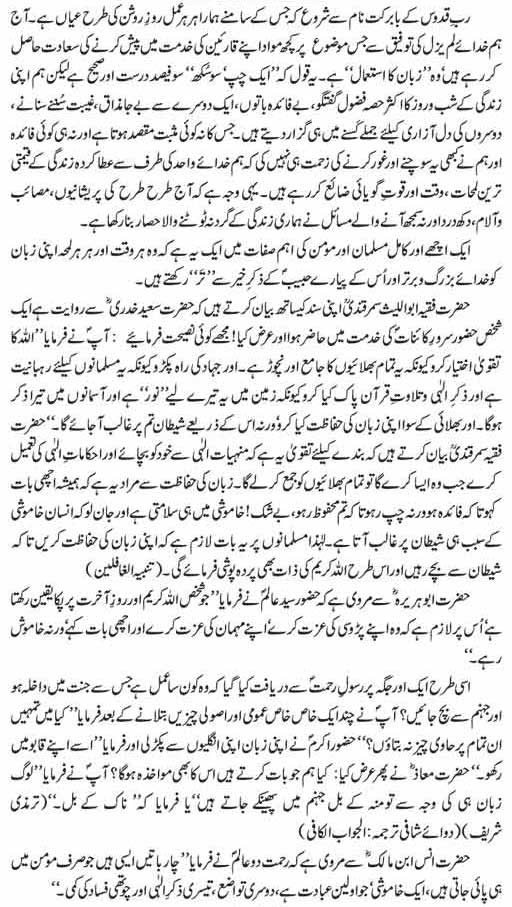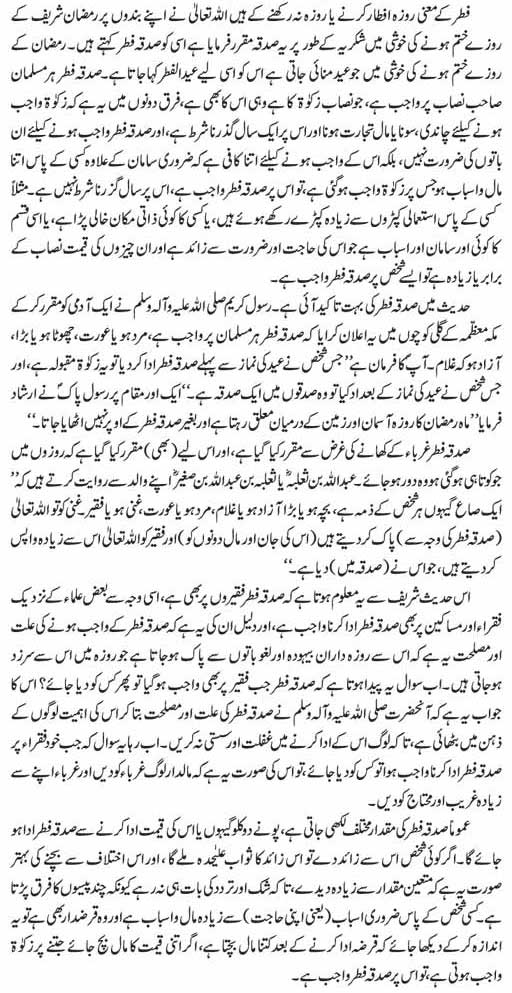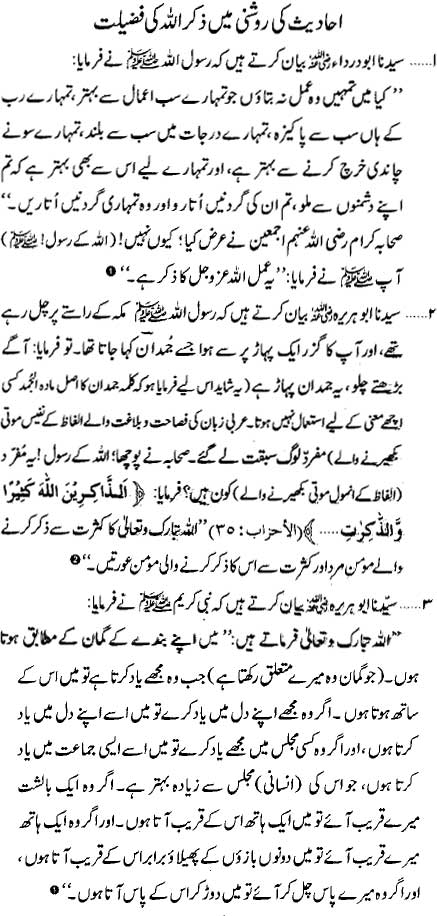
April 2022
After Ramadan
The Holy month of Ramadan came like seasonal rain and passed by. This rain did not water the plants and crops -it showered upon the hearts of believers. It is sad, but true, that the hearts of the majority of Muslims are stricken with spiritual drought and spiritual decadence. It is a drought caused by excessive indulgence in un-Islamic activities, immoral behavior, unjust actions, unfair dealings, etc. Drought caused by lack of rain destroys crops -drought caused by lack of piety, lack of fear of Allah, and lack of Allah consciousness destroys the SPIRITUALITY of the heart.
Ramadan’s spiritual rains brought to life the Masaajid and other prayer places. Ramadan had fanned the dying spark of charity . Ramadan had awakened the dying spirit of tolerance, patience, and sympathy for the less fortunate.
Now that we come to the end of Ramadan the big question is what to do? Did we go through all the spiritual exercises in Ramadaan in order that we may have the freedom to indulge, on Eid day, in all types of immoral, shameless, and indecent amusement? Did we restrain ourselves from halaal food, drinks, and other pleasures from dawn to sunset throughout Ramadan, so that we may return with renewed vigor to gambling, drinking, adultery, and fornication? Will the spirit of tolerance, mercy, patience, charity, and sympathy be still evident, or will these noble qualities be shelved until the dawn of the next Ramadan?
Will the Masajids which were filled on most nights in Ramadan remain the same or will they become empty wondering where the faithful have gone? Our lifestyles after Ramadaan will show whether we used the month to bring about a total reformation within ourselves or are we going to waste the valuable opportunity?
The National and international position of the Muslim communities leaves much to be desired. Muslims are lamenting the loss of lives, destruction of property, oppression, tyranny, injustice, and a host of other problems all over the world. They are wondering why the promised help of Allah to the believers is nowhere in sight. Just one glance into the lifestyles of the overwhelming majority of Muslims is sufficient to answer the question. Millions of Muslims do not have much to their credit besides Muslim names.
Allah’s help comes with action and Islamic qualities -not with names or faces – Arabs or non-Arabs, African or European, Chinese or Indians. On the other hand, every group, organization, society, or individual who talks about Islam, seems to have got its own brand of Islam. The Islamic teachings which were left behind for us, crystal clear and pristine pure, have become so adulterated with foreign customs, alien practices, and un-Islamic ideologies, that a new Muslim has to make an effort to search for the Quran and Sunnah brand of Islam or remain confused and ignorant.
May Allah Ta’ala on the occasion of Eid give us the guidance to resolve that we shall make the Quran and Sunnah our guiding lights and practice Islam as much as possible. If the non-Muslim inhabitants of our country see Islam in the lives of Muslims, they will not require much persuasion to accept our beautiful deen.
Eid Ka Falsafa Aur Tareekhi PasManzar

Muhammad Muneeb ur Rehman
Shawwal: What To Do On Eid Night, Eid Day, And During The Month?
Beginning of the Ashur-ul-Hajj
Shawwal is the first of the three months named “Ashhur al-Hajj” (i.e. the months of Hajj). Although the major acts of Hajj are normally performed in the first ten days of Zulhijjah, the whole period starting from the first of Shawwal up to the 10th of Zulhijjah is held to be the period of Hajj because some acts of Hajj can be performed any time during this period. For example, the Tawaf-ul-qudum, followed by the Sai’ of Hajj cannot be performed before Shawwal, while it can be performed any day after the beginning of Shawwal. Similarly, an ‘Umrah performed before Shawwal cannot be treated as the ‘Umrah of Tamattu: while the ‘Umrah performed in Shawwal can be affiliated to the Hajj, making it a Hajj of Tamattu: Moreover, the ihram of Hajj should not be started before Shawwal, because it makruh. For these reasons these three months have been named the ‘months of Hajj’ and the month of Shawwal has the distinction of being the first of these.
Eid-ul-Fitr
The second meritorious aspect of Shawwal is that it has been chosen by Allah Almighty for the celebration of “Eid-ul-Fitr”, one of the only two annual festivals recognized by the Shari’ah. This happy day is designed by the Shari’ah as a sign of gratefulness by the Muslims for the accomplishment of Ramadan and as an immediate reward by Allah for those who spent the month of Ramadan fasting and performing other forms of ‘ibadah.
Instead of commemorating an event from the past, the Shari’ah has prescribed the first of Shawwal as an annual festival for the Muslims at an occasion when they themselves accomplish a great ‘ibadah. This approach reminds the Muslims that they should not rely only on the accomplishments of their ancestors, rather, they should themselves perform meritorious acts to please their Creator.
In prescribing the ways to celebrate a happy day, Islam has adopted another unique approach. The festivals of other religions or nations normally comprise some acts of rejoicing and enjoyment. The whole happy day is normally spent dancing, singing, and playing.
In contrast, Islam has prescribed a simple yet graceful way to observe a happy day. First of all, it is mandatory for all the well-off Muslims to start their day by paying “Sadaqat-ul-Fitr” to the poor of their society, so that they, too, may enjoy the day along with others, and may not be worried about earning their livelihood at least on that day of happiness.
After paying the “Sadaqat-ul-fitr”, the Muslims are required to proceed to an open place where they can offer the Eid prayer collectively. In this way, they are supposed to present themselves before their Creator and offer two rak’ats of this special type of Salah, which makes them receive blessings from Allah and start their celebration with these divine blessings.
After the Salah also, they are supposed to rejoice in the day in a responsible manner, without violating the limits prescribed for them and never indulging in the acts prohibited by Allah.
Keeping this point in view, we will now discuss specific rules prescribed for observing the day of Eid-ul-fitr.
The Night Preceding ‘Eid-ul-Fitr’
It had been the practice of the Prophet, Sall-Allahu alayhi wa sallam, that he would not sleep in the night preceding the day of Eid-ul-Fitr. This night has been named in a Hadith as the Night of Reward (Lailatul Jaiza). Almighty bestows his rewards on those who have spent the month of Ramadan abiding by the dictates of Shari’ah, and all their prayers on this night are accepted. Therefore, it is desirable to perform nafl prayers on this night. The Prophet, Sall-Allahu alayhi wa sallam, is reported to have said:
Whoever stands up (in worship) in the nights preceding the two Eids expecting rewards from his Lord, his heart will not die when the other hearts will die. (Ibn Majah)
To benefit from this opportunity, one should perform as much worship on this night as he can, and should pray for all his needs and desires.
Before Going to Eid Prayer
The following acts are prescribed as Sunnah at the beginning of the day of ‘Eid-ul-Fitr before proceeding to the Eid prayer:
1. To wake up early in the morning.
2. To clean one’s teeth with a Miswaak or a brush.
Khutbah: The Address of ‘Eid-ul-fitr
In this Salah, Khutbah is a Sunnah and is delivered after the Salah, unlike the Salah of Jumu’ah where it is Fard and is delivered before the Salah. However, listening to the Khutbah of ‘Eid Salah is wajib or necessary and must be heard in perfect peace and silence.
It is a sunnah that the Imam begins the first Khutba by reciting takbirs ‘Allahu Akbar’ nine times and the second Khutbah by reciting it seven times.
Six Fasts in the Month of Shawwal
It is commendable to keep six fasts in the month of Shawwal. The Prophet, Sall-Allahu alayhi wa sallam, has said:
Whoever completes the fasts of Ramadan then adds to them the fast of six days in the month of Shawwal, it will carry the thawab of fasting for the whole year. (Sahih Muslim)
This hadith had described the great thawab of six fasts of this month. Therefore, the Muslims should take this opportunity of acquiring such an enormous reward from Allah. It is preferable to start these fasts from the 2nd of Shawwal and keep fasting up to the 7th of it. However, if, they are kept on other days, it is hoped that the requirement of the above hadith may also be fulfilled.
Dozakh Ka Bayan

The Secrets Of Dates
PROPHET Muhammad (PBUH) gave special attention to dates as part of the believer’s diet, especially during the holy month of Ramadan. Allah Almighty mentioned palm trees many times in the Qur’an and made its fruit the food of the dwellers of paradise.
So what are the secrets of this great nutriment? Is it possible to think of using dates as a remedy for some diseases? What do scientists of today say about dates?
Dates are one of the most nourishing fruits and it is sometimes called the “bread of desert.” More than two-thirds of dates’ weight is natural sugar.
This fruit was highly esteemed by the ancient civilizations more than 5,000 years ago. Ancient Egyptians considered dates as a symbol of fertility, while the Romans and the Greeks used them to ornament their stately triumph pageants. Today, dates are widely grown in the Arabian Peninsula, Iran, Egypt, Iraq, Spain, Italy, and the United States. There are more than 600 varieties of dates.
Dates and the pre-birth period
Dates stimulate the uterus by regulating and hastening its contractions to facilitate delivery. The uterus is a relatively large muscular organ and it urgently requires an adequate supply of natural sugar during labor and delivery.
Being a laxative, dates are essential for pregnant women before delivery in order to purge the colon and intestine and facilitate delivery. The Quranic verse explains this, as Allah tells Mary: And shake the trunk of the palm-tree towards thee – thou wilt cause ripe dates to fall upon thee [Mariam – 25]
Nutriment and medicine for children
Dates contain natural sugar which is easily absorbed and digested. Thus, it is safe and comforting for children’s stomachs and intestines. And date juice is useful especially if we mix it with milk – it becomes a very nourishing and restorative drink for children and adults. Dates and honey paste, taken three times a day, are used for the treatment of diarrhea and dysentery in children,
This paste also comforts and hardens the gums during teething and it facilitates the process.
Treatment for obesity
The wide variety of nutritious elements in dates makes it hunger resistive. The cause behind obesity is a persisting feeling of hunger and an appetite for food which drives a person to consume larger amounts of fats and sugar when he eats his meal.
So, treatment by eating a few dates when feeling hungry helps reduce hunger and be filled. These dates provide the body with the necessary sugar and stimulate the intestine, which reduces hunger greatly, and eventually, reduces food consumption. The Prophet’s saying shows this: A household that has dates doesn’t feel hunger. [Narrated by Muslim].
Remedy for liver and other inflammations
Dates remedy the liver and purge it from toxins. Breaking the fast with dates is one of the most magnificent natural remedies for the maintenance and purging of the liver from accumulated toxins. Also, drinking dates’ juice is the treatment of sore throat, various types of fever, rhinorrhea, and the common cold.
Having high medicinal and nutritious value, dates are expected to be the best food for the future. Dates contain as high a percentage as 88 percent of carbohydrate (starch), ( 2.5-5 percent) of fat, (2.3-5.6 percent) Protein, and (6.4-11.5 percent) of vitamins and dietary fiber. The flesh contains (0.2-5 percent) oil, whereas the seed’s weight is (7.7 -9.7 percent) oil. The weight of the seed is ( 6.6 – 14.2 percent) of the date’s weight.
Dates contain Vitamins A, B1 and B2, and fluorine which prevents teeth decay. Other minerals found in various proportions in dates include boron, calcium, cobalt, copper, iron, magnesium, manganese, potassium, phosphorous, sodium, and zinc.
Additionally, the seeds contain aluminum, cadmium, chloride, lead, and sulfur in various proportions. Selenium, an element believed to help prevent cancer and important in immune function, is also found in dates.
If you are feeling weak, don’t hesitate to take seven dates (70 gm) in the morning as the Prophet (PBUH) recommended. You will actually be taking 70 milligrams of calcium, which is very useful for the bones, joints, and nerves; 35 milligrams of phosphorus, which is nutritious for the brain; and 7 milligrams of iron, which strengthens the body in general and the heart in particular.
It’s also suitable for reducing weight as it contains only 0.25 gm of fat. This prophetic meal also regulates and stimulates the bowels with the 10 gm of dietary fiber it contains.
Sadqa Fitr Ki Haqeeqt

Laylat al-Qadr
[Sahih Al-Bukhari : Volume 3, Book 32, Number 232]
Narrated Ibn ‘Umar (Radi Allah Anhu) : Some men amongst the companions of the Prophet Muhammad (sal-Allahu- alleihi-wasallam ) were shown in their dreams that the night of Qadr was in the last seven nights of Ramazan. Allah’s Messenger (sal-allahu- alleihi-wasallam ) said, “It seems that all your dreams agree that (the Night of Qadr) is in the last seven nights, and whoever wants to search for it should search in the last seven nights of Ramazan.”
[Sahih Al-Bukhari : Volume 3, Book 32, Number 233]
Narrated Abu Salama (Radi Allah Anhu): I asked Abu Sa’id (Radi Allah Anhu) about the Night of Qadr and he said, “We practiced Itikaf in the middle third month of Ramazan with Prophet Muhammad (sal-allahu- alleihi-wasallam ). In the morning of the 20th of Ramazan, the Prophet Muhammad (sal-allahu- alleihi-wasallam ) came to and addressed us and said, ” I was informed of the date of the Night of Qadr but I was caused to forget it, or I forget, so search it in the last ten nights of the month of Ramazan.”
[Sahih Al-Bukhari : Volume 3, Book 32, Number 238]
Narrated ‘Ibn Abbas (Radi Allah Anha): The Allah’s Messenger (sal-allahu- alleihi-wasallam ) said, “Look for the Night of Qadr in the last ten nights of Ramazan on the night when nine or seven or five nights remain out of the last ten nights of the Ramazan.”
[Sahih Al-Bukhari: Volume 3, Book 32, Number 239]
Narrated Ibn Abbas (Radi Allah Anha) in this quotation: Allah’s Messenger (sal-allahu- alleihi-wasallam ) said, “The Night of Qadr is in the last ten nights of the month of Ramazan either on the first nine or in the last (remaining) seven nights of Ramazan.”
[Sahih Al-Bukhari : Volume 3, Book 32, Number 241]
Narrated ‘Aisha (Radi Allah Anhu): With the start of the last ten days of Ramazan, Allah’s Messenger (sal-allahu- alleihi-wasallam ) used to tighten his waist-belt (i.e. hard work) and used to offer Salat (Prayer) all the night, and used to keep his family awake for the Salat (prayers).
Hadith Ki Roshni Mein Zikr Allah Ki Fazeelat

5 Things About Suhoor
Suhoor is the early morning meal Muslims have before starting their fast. Here are some facts about Suhoor:
1. Prophet Muhammad (PBUH) used to take Suhoor and sometimes he took it with his Sahabah (Companions). Narrated Anas: Zayd Bin Thabit (R) said, “We took the Suhoor with the Prophet. Then he stood for the prayer.” I asked, “What was the interval between the Suhoor and the Adhan?” He replied, “The interval was sufficient to recite fifty verses of the Qur’an.” Sahih Bukhari Volume 3, Book 31, Number 144 ; Sahih Muslim Book 006, Number 2415.
2. Urging Muslims to have Suhoor the Prophet (PBUH) said: “Have Suhoor, as indeed there is a blessing in it.” The Prophet also said: “The difference between our fasting and the fasting of the People of the Book is the (meal of) Suhoor.”
3. Being the only meal eaten by Muslims from dawn to sunrise during the month of Ramadan, Suhoor typically tends to be heavy and is highly regarded by traditions to help avoid weakness caused by the fast. Suhoor as the morning meal is matched by Iftar as the evening meal, during Ramadan, replacing the traditional three meals a day (breakfast, lunch, and dinner).
4. The presence of night-criers – mesaharaty – roaming the streets in towns and villages is yet another tradition still alive in many Muslim countries. The night-crier stops in front of every house in the neighborhood, beating his drum and even calling out people by their names.
5. A Suhoor helps the fasting person persevere through the fast. Traditionally, the dates are considered important in Suhoor meal. Suhoor is intended to be a very humble meal to help remind Muslims that there are those who go without food daily.

